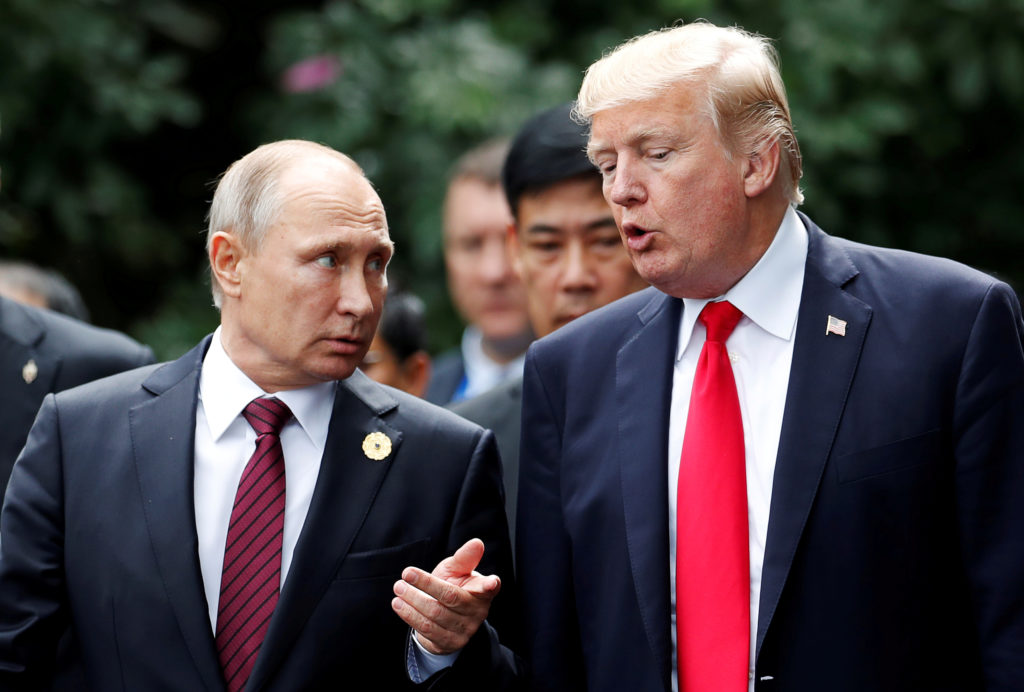Former U.S. President Donald Trump has dramatically shifted Washington’s position on the Ukraine war, aligning more closely with Russian narratives and challenging traditional US support for Kyiv.
In a series of statements this week, Trump labeled Ukrainian President Volodymyr Zelensky a “dictator”, accused him of corruption, and suggested that Ukraine, not Russia, bears responsibility for the war. His remarks follow a lengthy phone call with Russian President Vladimir Putin last week, reinforcing concerns that Trump’s second term could see a major realignment in US foreign policy.
“Zelensky better move fast, or he is not going to have a country left,” Trump wrote on Truth Social, a day after rejecting Ukraine’s refusal to grant the US access to its rare minerals.
Trump’s America First approach signals a fundamental shift away from US interventionism, with a focus on economic transactions over ideological alliances. His rhetoric has prompted praise from Russia, with Andrei Kelin, Moscow’s ambassador to the UK, stating that for the first time, the US appears “to be listening” to Russia’s perspective rather than dismissing it as disinformation.
Meanwhile, Trump has continued to undermine Zelensky’s credibility, repeating Kremlin-backed narratives and criticizing US financial aid to Ukraine as a “gravy train” benefiting Kyiv. His claims echo longstanding Russian propaganda, which seeks to frame Ukraine as a corrupt and illegitimate state.
Trump’s sharp rebuke of Zelensky has drawn mild dissent from some Republican senators:
- Lisa Murkowski (Alaska) stated, “I certainly would not call President Zelensky a dictator.”
- Susan Collins (Maine) and John Kennedy (Louisiana) distanced themselves from Trump’s remarks, with Kennedy calling Putin a “gangster.”
- Thom Tillis (North Carolina), fresh from a visit to Kyiv, reaffirmed that the war was solely the responsibility of Vladimir Putin.
However, these criticisms remain largely symbolic. With Trump dominating the Republican Party, few within his ranks have shown willingness to meaningfully challenge his foreign policy stance.
Zelensky has forcefully rejected Trump’s claims, stating that the former US president is operating within Russia’s “disinformation space.” His public criticism of Trump, however, may further alienate him from an administration that prefers loyalty over confrontation.
Vice President JD Vance dismissed Zelensky’s approach, warning that publicly criticizing Trump is the worst way to influence his policies.
Trump’s latest pro-Russian rhetoric follows a pattern of deference to Putin that dates back to his first term:
- In 2018, he publicly sided with Putin over US intelligence agencies regarding Russian election interference.
- He called Putin a “genius” when Russia launched its full-scale invasion of Ukraine in 2022.
- His foreign policy team, once populated with Russia skeptics like John Bolton and Mike Pompeo, is now filled with like-minded allies who share his worldview.
A February 2025 Pew survey highlights the growing skepticism of US support for Ukraine among Republican voters:
- Only 30% now believe the US is providing “not enough” or the “right amount” of aid—a sharp decline from 72% when the war began.
- 40% believe supporting Ukraine “hurts” US national security, compared to just 27% who say it helps.
With Trump leading a decisive shift in Republican foreign policy, the once-unquestioned US support for Ukraine is now being re-evaluated under the lens of economic interests and political transactions.
Trump’s latest comments mark a sudden but expected shift toward scaling back US military commitments to Europe, reinforcing his long-standing reluctance to confront Russia.
While the Biden administration has argued that standing against Russian aggression is vital to US national security, Trump and his allies see Ukraine as Europe’s problem, not America’s.
With global implications on the line, Trump’s foreign policy strategy is increasingly defined by a transactional approach—one that prioritizes US economic gain over democratic alliances and international norms.

